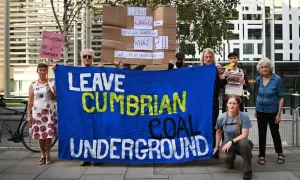UK’s first new coalmine for 30 years gets go-ahead in Cumbria


The UK will build its first new coalmine for three decades at Whitehaven in Cumbria, despite objections locally, across the UK and from around the world.
Michael Gove, the levelling up secretary, gave the green light for the project on Wednesday, paving the way for an estimated investment of £165m that will create about 500 new jobs in the region and produce 2.8m tonnes of coking coal a year, largely for steelmaking.
The mine will also produce an estimated 400,000 tonnes of greenhouse gas emissions a year, increasing the UK’s emissions by the equivalent of putting 200,000 cars on the road.
The vast majority of the coal produced will be for export, as most UK steel producers have rejected the use of the coal, which is high in sulphur and surplus to their needs.
Where these exports will go is uncertain, as most European steelmakers are turning away from the use of coal and adopting green methods such as electric arc furnaces and renewable energy.
The government said the mine was possible within the UK’s climate legislation, which requires the UK to reach net zero emissions by 2050, as operations will shut down by 2049.
In its report sent to Gove, the Planning Inspectorate claimed the mine would have “an overall neutral effect on climate change”. This, it said, was because the likely amount of coal used in steel making would be “broadly the same with or without” it.
A government spokesperson said the coal would be used to make steel that would otherwise have been imported and not to generate power.
Ministers, however, are braced for an almost-certain legal challenge by those who say the decision risks breaching that target.
Critics said the announcement was cynically timed to placate Tory MPs unhappy with the government for ending the moratorium on new onshore wind projects, which was confirmed 24 hours before.
The shadow climate change secretary, Ed Miliband, said the mine was “no solution to the energy crisis”, would not benefit British steel producers and marked “the death knell of any claims this government has to climate leadership”.
The UK should instead create sustainable jobs in renewable energy, he said, adding a Labour government would make Britain “a clean energy superpower”.
Zarah Sultana, Labour MP for Coventry South, said: “The Tories again show they put the fossil fuel industry before people and planet. Shameful.”
Green MP Caroline Lucas called the decision “a climate crime against humanity”. She said: “Instead of backing 1000s of green jobs & sustainable, long-term economic revival, Govt has backed a climate-busting, backward-looking, stranded asset coal mine.”
The decision “cancels out all the progress Britain has made on renewable energy”, said Tim Farron, the former Liberal Democrat leader who is the party’s environment spokesperson and a Cumbrian MP.
Environmental groups said the new mine would prove a costly and harmful mistake for the climate.
Greenpeace said the UK risked becoming “a superpower in climate hypocrisy rather than climate leadership” and that the mine would do “absolutely nothing” for the country’s energy security because the coal it contains can only be used for steelmaking.
Friend of the Earth said the mine would become an “expensive stranded asset” and would not replace Russian coal.
Laura Clarke, CEO of environmental law firm Client Earth, called the decision “unforgivable”. “Makes no sense in terms of the science, the economics, or indeed the UK’s legally binding netzero commitments,” she said.
The prime minister, Rishi Sunak, has faced down objections from green MPs within his party. The decision will be welcomed by Conservative rightwingers for whom the mine has become talismanic.
The mine’s backers have been trying to get the project off the ground since 2014. It got local approval in 2020 and was greenlit by ministers in 2021. But for the past two years the project has been beset by planning delays as the government rescinded its approval as it prepared to take on the presidency of global climate talks ahead of the Cop26 UN climate summit in Glasgow in November 2021.
The UK government handed over its presidency of the UN climate negotiations last month to Egypt, a year after the widely lauded Cop26 resolved to limit global temperature rises to 1.5C above pre-industrial levels, an achievement the Cop president, Alok Sharma, warned was “fragile”.
A report by the International Energy Agency last year, commissioned by the UK government while Cop president, found that no new fossil fuel development – of coal, oil, or gas – could take place if the world was to remain within the 1.5C limit.
Sharma said last weekend he was firmly against the mine. He said: “Over the past three years the UK has sought to persuade other nations to consign coal to history, because we are fighting to limit global warming to 1.5C and coal is the most polluting energy source.
“A decision to open a new coalmine would send completely the wrong message and be an own goal. This proposed new mine will have no impact on reducing energy bills or ensuring our energy security.”
Philip Dunne MP, the chair of the environmental audit committee, said: “Coal is the most polluting energy source, and is not consistent with the government’s net zero ambitions. It is not clear-cut to suggest that having a coalmine producing coking coal for steelmaking on our doorstep will reduce steelmakers’ demand for imported coal.
“On the contrary, when our committee heard from steelmakers earlier this year, they argued that they have survived long enough without UK domestic coking coal and that any purchase of coking coal from a potential site in Cumbria would be a commercial decision.”
Nicholas Stern, the acclaimed economist who has worked on the climate, development and public policy, said the mine would be damaging to the UK, and the world.
“Opening a coalmine in the UK now is a serious mistake: economic, social, environmental, financial and political,” Lord Stern said. “Economically, it is investing in the technologies of the last century, not this, and that is the wrong path to growth. Socially, it is pursuing jobs in industries that are on the way out, creating future job insecurity.
“Environmentally, it is adding to world supply and thus consumption of coal and releasing greenhouse gases when there is an urgent need to reduce them. And politically, it is undermining the UK’s authority on the most important global issue of our times.”
Read more:
UK’s first new coalmine for 30 years gets go-ahead in Cumbria
